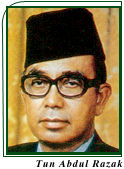|
|
|
 |

 |
18 January 1998
 Then, as now, no aspiring politician would have
lost out by making friends with those working at the Umno headquarters. Then, as now, no aspiring politician would have
lost out by making friends with those working at the Umno headquarters.
There should always be one or two informative and helpful persons ever ready to extend
the helping hand.
At the Umno headquarters, I formed close friendships with a number of officials,
two of whom were very senior - the late Tan Sri Ghazali Jawi, a former Mentri Besar
of Perak and Malayan ambassador to Cairo, who was then secretary-general, and the
late Tan Sri Syed Jaafar Albar, a former deputy minister, and the chief information
officer. Ghazali's son, Datuk Tajol Rosli (deputy Minister of Home Affairs) has followed
him into politics as had Albar's son, Datuk Syed Hamid, the Minister of Defence.
Both are good friends.
Syed Hamid has done better than his late father in terms of ministerial position
but so far he is a thin shadow of his controversial father. Tajol is well behind
his father's many achievements. I can say this much: he is a reliable political ally,
and I was glad when Prime Minister Datuk Seri Dr. Mahathir Mohamad chose Tajol to
succeed his long-time loyal aide Datuk Seri Megat Junid as deputy Minister of Home
Affairs.
Ghazali remained close to me because he felt included in Razak's "political
circle" even if not in the "inner circle". He was a strong helping
hand in the Umno Supreme Council election in 1975, which was crucial and determined
the line of succession after Razak.
Albar, a vice presidential candidate, and I became estranged politically because
he perceived himself to be excluded - nothing further from the truth.
I was fond of Albar but he was persuaded by one or two people with crucial "vested
interest" to see "communists under every table". He became so unlike
him, not the man I once knew and respected. Albar became united to an Umno group
which was on the periphery of the mainstream, not by a commonality of politics, of
background and upbringing but rather by political expediency. The group used him
for their own political end and forgot Albar soon after he died.
His successor as Umno Youth leader, Datuk Suhaimi Kamaruddin, two years my junior
in Kuala Kangsar was a lightweight flip-flop who was edged out into oblivion by the
charismatic heavyweight Datuk Seri Anwar Ibrahim, many years his junior at MCKK,
in 1982.
One day in the autumn of 1962, Ghazali asked me to accompany him to Sarawak. On my
return, I wrote Razak a report on the prospects of Sarawak joining Malaysia. He must
have either found it perspicacious or presumptuous or both. I was astounded at the
speed with which he must have read the report for the next day I got a telephone
call from his private secretary. Razak had sent for me.
Aziz Hussein (now a Datuk and several years ahead of me at MCKK) said "the Tun"
(Razak was always referred to as "the Tun") wanted to see me in the afternoon.
Razak probed me quite intensely. You see he had been deputy chairman of the Lansdowne
Commission which had investigated and recommended various safeguards and privileges
for the natives of North Borneo (now Sabah) and Sarawak in the proposed Malaysian
Federation.
I could not have therefore told him a fairy tale, perhaps, a bit tendentious. In
any event, Razak must have been impressed with it. As a result, my fate was sealed
as you would soon see.
Two months or less after I met Razak, the Brunei Revolt broke out in early December
1962. Nik Hassan bin Abdul Rahman, (now Datuk), the prime minister's private secretary,
asked me to come to the Residency to see the Tunku. Before seeing the Tunku, Nik
Hassan told me I was asked because the editor of Merdeka, the Umno weekly, the late
Encik Ibrahim Mahmood, was out of town.
The Tunku wanted an editorial attacking the rebellion in the next issue of the newspaper.
"Perhaps, a fresh face like you can give a fresh perspective," Nik Hassan
said to me before we marched into Tunku's study.
The Tunku asked me to write down what he dictated, "everything" he stressed.
The Tunku was very incensed by the rebellion because he saw it as an insidious attempt
to sabotage the formation of Malaysia and to dethrone the Sultan of Brunei whom he
was very fond of until Tuanku Sir Omar Ali Salfuddin decided against joining Malaysia
nine months afterwards. Then, his affection altered. It was a natural thing after
what he and Malaya did for Brunei.
Malaya sent a police contingent to help assist British and Gurkha troops from Singapore
to suppress the revolt. We also had our civil servants seconded to the sultanate
in the fifties and early sixties.
I did not know what the Tunku or Nik Hassan said to Razak but whatever it was it
only endeared me to him. Razak's younger brother, Abdul Latiff, my good friend and
a year ahead of me at MCKK, was an inspector with the Brunei Police Force and had
played a commendable role in defending the Brunei throne. Latiff, a favourite of
Razak was always in contact with me and that also enhanced my growing relationship
with Razak.
I went to Sarawak, Singapore and Brunei on Razak's instructions to make political
contacts and celebrated the formation of Malaysia Day in Singapore at the Government
House where I met an attractive Malay actress-dramatist. We dated for a year or so.
She, like me, is happily married.
|

|
|
|
|